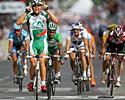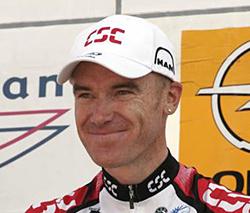
Recently on Cyclingnews.com |
An interview with Stuart O'Grady, November 30, 2006
"A real fighting year"
2006 proved you can take Stuart O'Grady away from the fight, but you can't take the fight out of Stuart O'Grady. At 33 years old, though, what's he fighting for? Story by Anthony Tan.
"What do I want to get out of it?" he asks, repeating my question as we share a taxi ride en route to Sydney airport on a fine November day. "I just want to win Classics. That's it."
As soon as Stuart O'Grady signed the dotted line for Team CSC at the end of October last year, he knew he was sacrificing sprint stages and the green jersey at the Tour de France, at one point his sole cycling obsession. "But it obviously didn't bother me. I was really excited by the new challenge," he says.
Another challenge began a few weeks before then, however, when he discovered the team he previously signed for this season, Sony-Ericsson, was not a team at all. Team manager Giancarlo Ferretti was conned into thinking he'd lined up a major global sponsor, and Gilberto Simoni, Matt White, Salvatore Commesso and Cristian Moreni among others went scrambling for jobs. Most found new homes, but were snapped up at bargain basement prices.
"I was definitely calling upon the same type of attitude"- Once Ivan Basso left the Tour de France, Stuart O'Grady found himself in a similar situation to what he faced in 2004, when his Cofidis team was suspended |
"Bjarne's not a silly man - he didn't want a two-year contract and neither did I for that kind of money," O'Grady says of the sort of negotiation climate he faced with CSC owner and team manager Bjarne Riis at the time.
"I took a pretty big cut, but like I said, it wasn't a problem. At the end of the day, I was back overseas... I knew that's what it would take to get results. I just needed a bit of luck.
" My main objective was to get into a good, solid, hopefully one of the best, ProTour teams," he adds, emphasising his words. "I could of gone elsewhere for more money - but I knew that wasn't the answer to the problem. I didn't care about the money. I just wanted to get into a big team and worry about money later on."
He knew Riis was interested - a few casual meetings took place a few years ago during his tenure leading French teams Cofidis and Credit Agricole. But he also knew CSC was the best team for him; and so did Riis. "I wanted to prove to him that it wasn't a mistake. I wanted to show him what I was made of. So we make a pretty quick agreement and it was done."
Once the deal was done, O'Grady turned his attention towards three early season objectives: Milan-San Remo, the Tour of Flanders and making the team for Paris-Roubaix. Selection for the Tour de France was also on the cards, but still some way off.
________________________

|
San Remo was a big goal. He'd finished third two years ago behind Oscar Freire and Erik Zabel, and fourth last year on the Via Roma, won by Alessandro Petacchi. But less than a fortnight before the main event, while racing the Tirreno-Adriatico stage race, O'Grady found himself the victim of some typical Italo argy-bargy, shooting straight into a large pothole.
It wasn't a case of dusting himself off and getting back on the bike. A broken collarbone and five broken ribs ended Stuey's spring in one fell swoop.
Team CSC had a great classics campaign without him: Fränk Schleck created a spectacular finale to San Remo; Fabian Cancellara won a magnificent 104th edition of 'The Hell of the North'; then Schleck confirmed his growing talent as he left the field behind on the Cauberg in the Amstel Gold Race. "And that's why missing the spring was such a setback," says O'Grady, no doubt believing it could have been even better for a squad known for its militaristic precision and a philosophy bound by teamwork.
"It was a real fighting year; I had to call upon all my strengths to continue and keep going. I just didn't want to give in that easily," he says. "Things had to get better - it couldn't have got much worse."
Fortune finally turned in O'Grady's favour. He was selected for the Tour de France team, and CSC's nine boasted the man everyone saw as the successor to Lance Armstrong's throne and current Giro d'Italia champion, Ivan Basso.
2004 was the year O'Grady missed the majority of the spring classics when a number of members of his Cofidis team found themselves at the centre of what turned out to be some well-founded doping allegations. Management decided to suspend the team from racing, even though most riders including himself were neither charged or implicated. When O'Grady came back, he came back with a vengeance, enjoying his best season ever.
"I was definitely calling upon the same type of attitude," he recalls of his feelings prior to La Grande Boucle.

|
Yet, with less than 24 hours before the start in Strasbourg, the three biggest favourites including Basso were expelled as damning information flew in from the Spain's Guardia Civil. Arriving in bits and pieces that further heightened some very dark days, the infamous investigation known as Operación Puerto was clearly in full swing.
"It was a hard time for everyone in the team," O'Grady admits. "It's just frustrating; you aren't involved, but you are involved.
"I had a job to race that Saturday, and you can't sit around and cry about what happened. It would have been easy to ditch the race, but that's not the attitude of the team. Luckily, we had a rider like Carlos [Sastre], happy to step up to plate and take full responsibility, which isn't an easy task. We wanted to show what we could do under hard situations."
He says his team wanted to prove a point, to prove others wrong: "When people start doubting you, you just want to go out there and try and smash them even harder to prove otherwise."
O'Grady's role at the Tour was therefore no different; he was still required to take on the same responsibilities. When racing finally began, his job simply changed from Basso to Sastre, and the South Australian made this clear to the Spaniard from the outset: "I was prepared to do exactly the same thing [for Sastre], and that was comforting for him."
Incredibly, his luck took another tumble after a crash on the stage to Valkenburg in Holland, the same day pre-race favourite Alejandro Valverde crashed and exited Le Tour. Part of O'Grady's job was to cover any dangerous breaks, but for the next few days, the job was simply to keep sight of the peloton.
O'Grady recalls: "After the crash, it wasn't a problem, because I just wasn't capable of cover the breaks 10 days after my crash - it was a case of survival. Which made my job easier in a way, because I was just looking after Carlos 100 percent."
________________________

